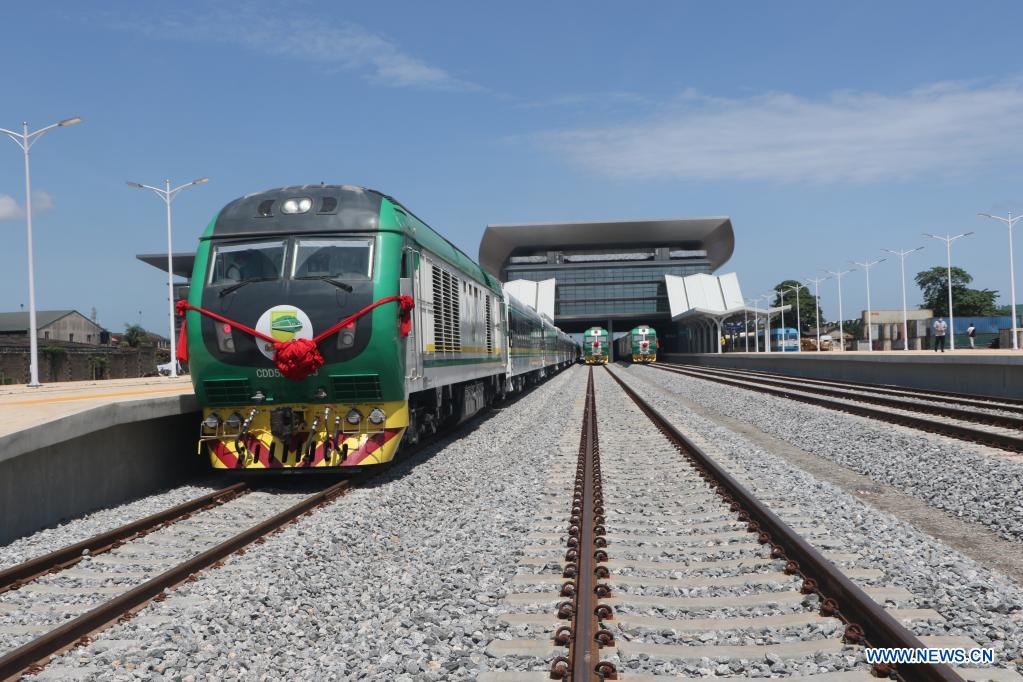Nigeria flags off full commercial operation of China-assisted railway
Nigeria on Thursday officially started the full commercial operation of a China-assisted railway linking the southwestern cities of Lagos and Ibadan, to ease public transportation and fuel goods movement in the west African country.
Nigeria on Thursday officially started the full commercial operation of a China-assisted railway linking the southwestern cities of Lagos and Ibadan, to ease public transportation and fuel goods movement in the west African country.

Trains park on the track at the Mobolaji Johnson Railway Station of the Lagos-Ibadan railway in Lagos, Nigeria, on June 10, 2021. Nigeria on Thursday officially started the full commercial operation of a China-assisted railway linking the southwestern cities of Lagos and Ibadan, to ease public transportation and fuel goods movement in the west African country. (Photo by Emma Houston/Xinhua)
At a ceremony to flag off the commercial operation of the Lagos-Ibadan railway at the Mobolaji Johnson Railway Station in Lagos, the country's economic hub and most populous city, Nigerian President Muhammadu Buhari described the completion of the project as "another milestone in the drive to revitalize the railway system in Nigeria."
Buhari said the commencement of full operations of the rail line, constructed by the China Civil Engineering Construction Corporation (CCECC), will also establish the railway in Nigeria "as a choice of transportation for both passengers and freight."
The new rail line covers about 157 km with an extension of about 7 km to a busy port in Lagos, with a design speed of 150 km per hour.
Railway construction is a major part of the China-African cooperation and a flagship project of China-Nigeria practical cooperation and bilateral relations.
The Lagos-Ibadan railway is a segment of the Lagos-Kano standard gauge railway under construction in Nigeria.
Rotimi Amaechi, the minister of Transportation, told Xinhua in an interview at the ceremony that the railway is an "impact we have on the economy," because it will move goods, personnel and services in a record time.
"It has very good quality," Amaechi said.
Governor of Lagos Babajide Sanwo-Olu acknowledged the rail project as "a big boost to the overall vision of the national integration," saying it will encourage the private sector, local communities, and individuals to take advantage of the opportunity that the rail line has thrown up.
"With the commissioning of this rail line today (Thursday), it will now be possible for people to work in Lagos and live outside Lagos, and vice versa," the governor said. "It will radically transform the life, work, and the leisure for multitudes of our citizens along this (Lagos-Ibadan) corridor. It will open opportunities for investments, real estate corridor, urban development, commerce, and so on."
The Mobolaji Johnson Station in Lagos, where the flag-off ceremony took place, is one of the largest railway stations in West Africa, with a holding capacity of 6,000 passengers.
Chinese Ambassador to Nigeria Cui Jianchun said aside from transporting people and goods, the smooth opening of the commercial operation of the Lagos-Ibadan railway is also a real way to change and improve the quality of Nigerian people's life.
"This flag-off ceremony not only reflects China's support for Nigeria's economic and social development, but it is also a testimony of the far-sighted decision of the Nigerian government," said Cui.
He said China would continue to uphold the principle of sincerity, real result, amity, and good faith to work with Nigeria to overcome challenges and to perform a Belt and Road Initiative symphony of cooperation.
The CCECC began construction of the Lagos-Ibadan railway in March 2017, rising to the challenges of the tight construction schedule and complex construction environment amid the impact of the COVID-19, according to Jiang Yigao, the chairman of the board of CCECC Nigeria Ltd.
On Dec. 7, 2020, the railway began a test run between the two Nigerian southwestern cities, covering the journey in about three hours, with a single round-trip per day in the initial phase, said Jiang.
Nigerian cabinet officials, state governors, heads of government agencies, as well as captains of industries, among others, attended the flag-off ceremony for the commercial operation of the Lagos-Ibadan railway.

